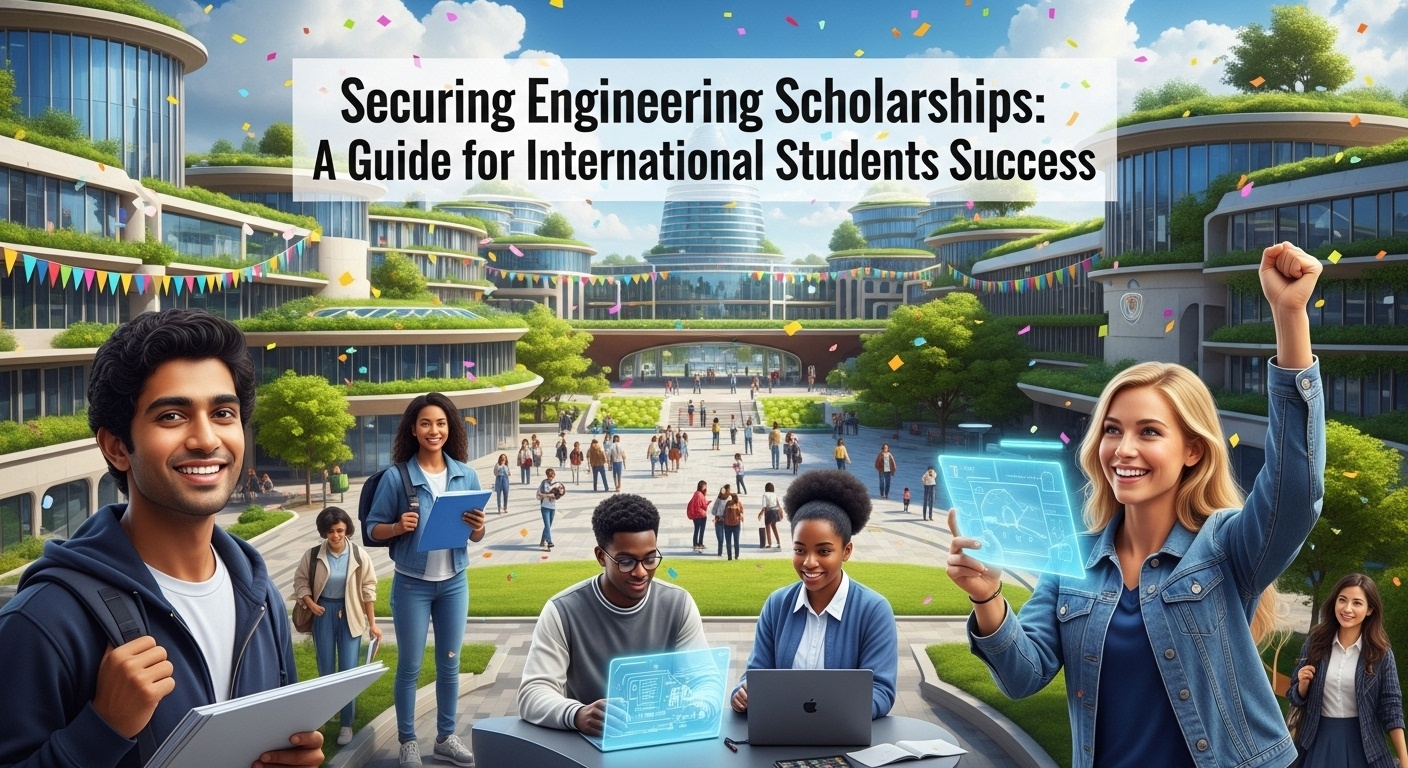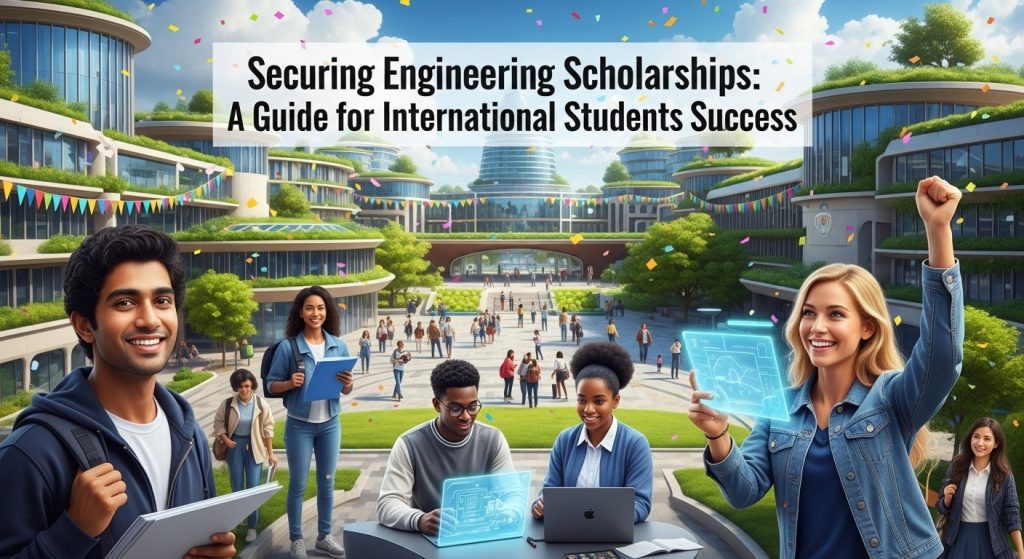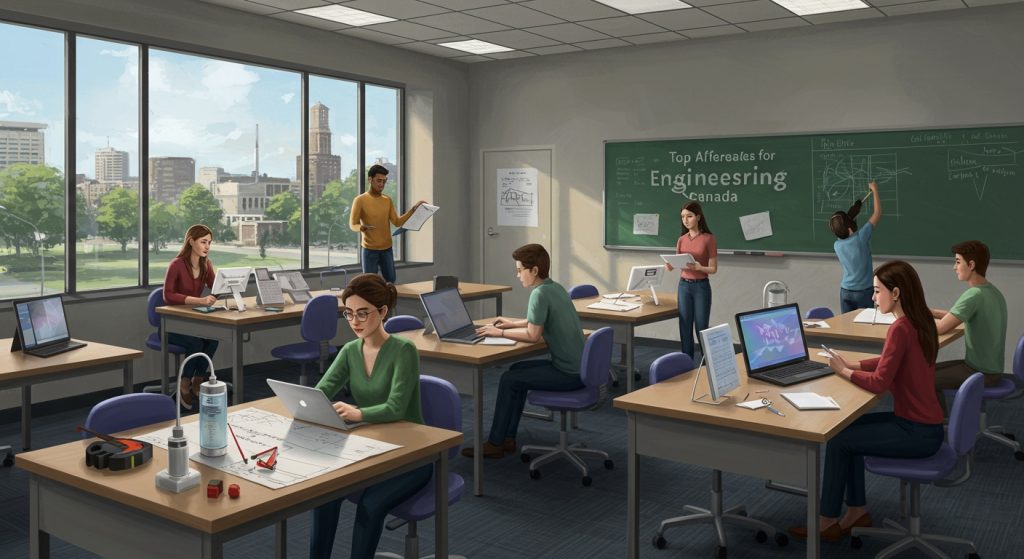Securing funding for an engineering education abroad can feel like navigating a complex algorithm, especially with the increasing demand for STEM expertise globally. Opportunities abound, yet success hinges on strategic preparation. Consider, for example, the surge in AI-focused scholarships driven by industry giants and governments alike, reflecting the current talent race. But, simply meeting the academic criteria isn’t enough. This is about demonstrating a deep understanding of your chosen field, showcasing relevant project experience – perhaps through contributions to open-source platforms – and articulating a clear vision for your future impact. It’s about crafting a compelling narrative that resonates with selection committees and sets you apart from a highly competitive international applicant pool.

Understanding the Landscape of Engineering Scholarships for International Students
The pursuit of an engineering degree abroad can be a transformative experience. It often comes with significant financial hurdles. Scholarships specifically designed for international students in engineering fields offer a crucial lifeline. These scholarships are diverse, ranging from merit-based awards recognizing academic excellence to need-based grants designed to alleviate financial burdens. Some are highly competitive, targeting top students globally, while others focus on specific demographics or engineering disciplines.
Understanding this landscape requires recognizing the different types of scholarships available. Merit-based scholarships reward outstanding academic achievements, often requiring high GPAs, standardized test scores. Impressive extracurricular involvement. Need-based scholarships consider the applicant’s financial circumstances and ability to fund their education. Some scholarships are also tied to specific engineering fields, such as civil, mechanical, electrical, or computer engineering, reflecting the demand and strategic importance of these areas.
For instance, the Fulbright Foreign Student Program offers scholarships for graduate studies in the United States, including various engineering disciplines. Similarly, the Erasmus Mundus Joint Master Degrees provide funding for students pursuing master’s programs in Europe, often with a focus on technological and engineering innovations. Specific universities also offer their own scholarships, such as the University of Toronto’s Lester B. Pearson International Scholarship, which supports outstanding international students pursuing undergraduate studies, including engineering.
Crafting a Compelling Scholarship Application
A strong scholarship application goes beyond simply filling out a form. It requires a strategic approach that highlights your unique qualifications, passion for engineering. Potential to contribute to the field. The key components of a compelling application include:
- Academic Excellence: A strong academic record is the foundation of any successful application. Maintain a high GPA, excel in relevant coursework (such as mathematics, physics. Chemistry). Aim for top scores on standardized tests like the TOEFL or IELTS (for English proficiency) and the GRE (if required).
- Statement of Purpose: This is your opportunity to tell your story and articulate your aspirations. Clearly state your interest in engineering, your specific area of focus. How the scholarship will enable you to achieve your goals. Highlight your unique experiences, skills. Motivations.
- Letters of Recommendation: Request letters from professors or mentors who know you well and can speak to your academic abilities, character. Potential. Provide them with ample time and insights about the scholarship and your goals.
- Extracurricular Activities: Participation in relevant extracurricular activities, such as engineering clubs, robotics competitions, or research projects, demonstrates your passion for engineering and your commitment to learning beyond the classroom.
- Demonstrated Leadership: Highlight any leadership roles you have held, whether in academic, extracurricular, or community settings. Leadership experience showcases your ability to motivate others, solve problems. Take initiative.
Consider this example: Imagine a student applying for a scholarship in environmental engineering. In their statement of purpose, they could describe a personal experience witnessing the impact of pollution in their community. They could then explain how this experience motivated them to pursue environmental engineering and develop sustainable solutions. They could also highlight their involvement in a local environmental organization or a research project focused on renewable energy.
Identifying the Right Scholarship Opportunities
Finding the right scholarship opportunities requires diligent research and a strategic approach. Start by exploring online databases and websites dedicated to international scholarships. Some popular resources include:
- Scholarships. Com: A comprehensive database of scholarships for students of all backgrounds and fields of study.
- InternationalScholarships. Com: Specifically focused on scholarships for international students.
- EduBirdie. Com: A good source of scholarship insights and advice for international students.
- Fastweb. Com: A US-based scholarship search engine with a large database of awards.
- University Websites: Many universities offer their own scholarships for international students. Check the websites of universities you are interested in attending.
When searching for scholarships, use specific keywords related to your field of study (e. G. , “electrical engineering scholarship,” “mechanical engineering scholarship,” “civil engineering scholarship”), your nationality. Your academic level (e. G. , “undergraduate scholarship,” “graduate scholarship”). Pay close attention to eligibility criteria, application deadlines. Required documents. Create a spreadsheet or database to track the scholarships you are interested in and their respective deadlines.
For instance, a student from India interested in studying computer engineering in Canada might search for “computer engineering scholarships India Canada” or “international student scholarships University of Waterloo.” They should then carefully review the eligibility requirements for each scholarship to ensure they meet the criteria.
Mastering the Application Timeline and Deadlines
Scholarship applications often have strict deadlines. Missing these deadlines can be detrimental to your chances of securing funding. It is crucial to create a detailed timeline and manage your time effectively. Start by identifying the application deadlines for the scholarships you are interested in. Work backward from the deadline to create a schedule for completing each step of the application process, including:
- Researching Scholarship Opportunities: Allocate sufficient time to thoroughly research available scholarships and identify those that align with your qualifications and goals.
- Preparing Application Materials: Gather all required documents, such as transcripts, test scores, letters of recommendation. Essays.
- Writing Essays and Personal Statements: Dedicate ample time to crafting compelling and well-written essays that showcase your unique qualifications and aspirations.
- Requesting Letters of Recommendation: Give your recommenders plenty of notice and provide them with all the necessary insights about the scholarship and your goals.
- Reviewing and Editing: Before submitting your application, carefully review all materials for errors in grammar, spelling. Content. Ask a trusted friend or mentor to proofread your application.
- Submitting the Application: Submit your application well before the deadline to avoid any last-minute technical issues.
Consider setting reminders in your calendar and using project management tools to stay organized and on track. For example, if a scholarship deadline is December 31st, you might set reminders for researching scholarships by September 30th, requesting letters of recommendation by October 31st. Completing your essays by November 30th. This proactive approach will help you avoid feeling overwhelmed and ensure that you submit a polished and complete application.
Networking and Seeking Guidance
Networking with professionals and seeking guidance from mentors or advisors can significantly enhance your scholarship application. Attend career fairs, engineering conferences. Details sessions to connect with industry experts and learn about scholarship opportunities. Reach out to professors, advisors. Alumni who have experience with international scholarships and ask for their advice and support.
Consider joining professional organizations, such as the Institute of Electrical and Electronics Engineers (IEEE) or the American Society of Civil Engineers (ASCE), which often offer scholarships and networking opportunities for students. Attend their conferences and workshops to meet professionals in your field and learn about the latest trends and innovations. Many universities also have international student offices or career centers that can provide guidance on scholarship applications and career development.
For example, you could reach out to a professor who has previously mentored international students and ask for their feedback on your statement of purpose. You could also attend a career fair and speak with representatives from engineering companies to learn about their scholarship programs and internship opportunities.
Showcasing Your Engineering Skills and Projects
In addition to academic achievements and extracurricular activities, it is crucial to showcase your engineering skills and projects in your scholarship application. Highlight any relevant projects you have worked on, whether in academic, professional, or personal settings. Describe the challenges you faced, the solutions you developed. The impact of your work. Provide evidence of your skills through portfolios, presentations, or demonstrations.
If you have participated in engineering competitions, such as robotics competitions or design challenges, describe your role in the team, the project you worked on. The results you achieved. If you have completed internships or research projects, explain your responsibilities, the skills you gained. The contributions you made. If you have developed personal engineering projects, such as building a website, designing a mobile app, or creating a hardware prototype, showcase your creativity, problem-solving abilities. Technical skills.
For instance, a student applying for a scholarship in mechanical engineering could showcase their involvement in a project designing and building a solar-powered car. They could describe the design process, the materials used, the challenges encountered. The performance of the car. They could also include photos or videos of the car in action.
The Importance of a Standout Essay
The essay is often the most crucial component of a scholarship application, as it allows you to showcase your personality, passion. Unique qualifications. A standout essay should:
- Answer the Prompt Directly: Carefully read the essay prompt and ensure that your essay directly addresses the question being asked.
- Tell a Story: Use storytelling techniques to engage the reader and make your essay memorable. Share personal anecdotes, experiences. Insights that demonstrate your character and motivations.
- Show, Don’t Tell: Instead of simply stating your qualities, provide specific examples and evidence to support your claims.
- Be Authentic: Write in your own voice and be genuine in your expression. Avoid using common phrases or generic statements.
- Proofread Carefully: Ensure that your essay is free of errors in grammar, spelling. Punctuation.
For example, instead of writing “I am a hard worker,” you could write “During my internship at XYZ Engineering, I consistently exceeded expectations by taking on additional responsibilities and completing projects ahead of schedule.” Instead of writing “I am passionate about engineering,” you could write “My passion for engineering stems from my childhood fascination with taking apart and rebuilding electronic devices. I was always curious about how things worked and eager to find solutions to complex problems.”
Leveraging Online Resources and Tools
The internet offers a wealth of resources and tools that can assist you in your scholarship search and application process. Utilize online databases, scholarship search engines. University websites to identify potential opportunities. Take advantage of online writing resources, such as grammar checkers, style guides. Essay editing services, to improve the quality of your application materials. Use project management tools to stay organized and on track with deadlines.
Consider using online forums and communities to connect with other international students and share insights about scholarships and application tips. Many universities and organizations have social media groups where students can ask questions, share resources. Network with peers. Take advantage of these online communities to learn from the experiences of others and gain valuable insights.
For instance, you could use Grammarly to proofread your essays, Purdue OWL to learn about proper citation formats. Trello to manage your scholarship application deadlines. You could also join online forums like Reddit’s r/InternationalStudents to connect with other students and share tips and advice.
Following Up and Expressing Gratitude
After submitting your scholarship application, it is essential to follow up with the scholarship provider to confirm that your application has been received and to inquire about the timeline for the decision-making process. Send a polite and professional email expressing your continued interest in the scholarship and thanking the provider for their consideration.
If you are awarded a scholarship, promptly express your gratitude to the scholarship provider. Send a thank-you letter or email acknowledging their generosity and explaining how the scholarship will help you achieve your academic and career goals. Consider sharing your progress and accomplishments with the scholarship provider throughout your studies to demonstrate the impact of their investment in your education.
For example, you could send an email to the scholarship provider saying, “Dear [Scholarship Provider], I am writing to express my sincere gratitude for awarding me the [Scholarship Name]. This scholarship will significantly reduce my financial burden and allow me to focus on my studies in mechanical engineering. I am committed to making the most of this opportunity and contributing to the field of engineering. Thank you again for your generosity and support.”
Conclusion
Securing engineering scholarships as an international student is undeniably challenging. Entirely within reach with the right strategy and unwavering dedication. Remember, it’s not just about stellar grades; it’s about showcasing your unique story, your passion for engineering. Your potential to contribute meaningfully to the field. Consider tailoring your application essays to highlight how your background offers a unique perspective, perhaps referencing a specific engineering challenge in your home country that you’re driven to solve. Don’t underestimate the power of networking; attending virtual conferences and connecting with professors in your field can provide invaluable insights and potential recommendation letters. As AI is increasingly integrated into scholarship application processes, ensure your essays are authentic and reflect your individual voice. My personal tip? Start early, proofread meticulously. Never be afraid to seek feedback. The journey may be long. The reward of pursuing your engineering dreams with financial support is immeasurable. Stay persistent, stay focused. Believe in your ability to succeed. Check out this article about future trends in university education to stay informed.
More Articles
Top Universities For Biotech Research: A Guide to Academic Excellence
Biotech Degree: Exploring Lucrative Career Paths After Graduation in 2025
Future of Learning: Emerging Trends in State University Education India
Ace NIT Entrance Exams: A Comprehensive Strategy for 2025 Success
FAQs
So, what exactly makes engineering scholarships for international students so competitive?
Good question! It’s a double whammy. First, engineering is popular, so lots of students are applying. Second, international students are often competing for a smaller pool of funding specifically earmarked for them. That’s why a stellar application is crucial!
Okay, I get that. But what kind of stuff do scholarship committees really care about? Grades, obviously. What else?
Grades are definitely crucial. Committees want to see a well-rounded candidate. Think leadership experience (like heading a club or volunteering), impactful projects (did you build a robot or code something cool?). A genuine passion for engineering. , show them you’re not just book smart. You’re going to do something amazing with your engineering degree.
Are there specific types of engineering that have more scholarship money available?
That’s a smart question to ask! While it varies year to year, fields like environmental engineering, renewable energy. Sometimes even cybersecurity often have more funding opportunities due to current global needs and research priorities. Do your research into emerging fields!
What are some common mistakes international students make when applying for these scholarships?
One biggie is not following instructions to the letter. Scholarship committees are super detail-oriented, so make sure you meet every requirement perfectly. Another is submitting a generic application – tailor it to each scholarship. Show them you grasp their mission and how you align with it. Proofreading is crucial too – typos can sink your application fast!
How early should I start looking for scholarships?
As early as humanly possible! Seriously, start your search at least a year before you plan to start your studies. Many scholarships have deadlines that are months, even a year, in advance. Early bird gets the worm, as they say!
Are essays really that vital? What are they looking for?
Absolutely! Think of the essay as your chance to shine beyond your GPA and test scores. They want to see your personality, your motivations. Your ability to communicate effectively. Tell a compelling story, be authentic. Show them why you deserve that scholarship. Don’t just rehash your resume!
Should I only be looking at scholarships offered by universities, or are there other places to find them?
Definitely branch out! While university scholarships are great, explore external organizations, professional engineering societies. Even government programs in your home country. A wider net means a better chance of catching something amazing!



